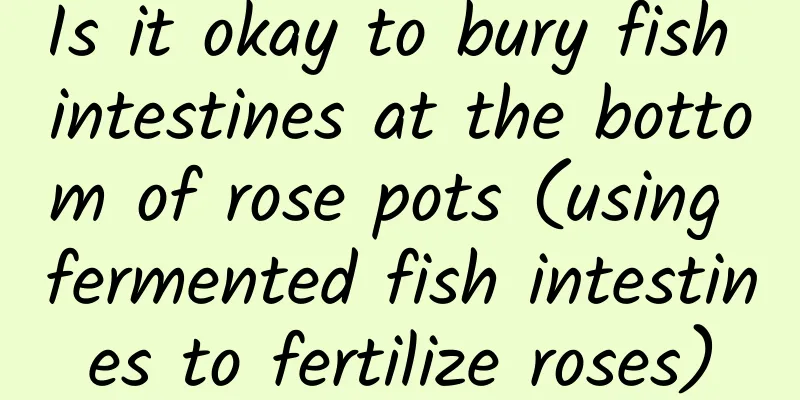Is it okay to bury fish intestines at the bottom of rose pots (using fermented fish intestines to fertilize roses)

|
Winter is a good time to apply base fertilizer to roses. It is certainly possible to bury fish intestines in winter. However, uncomposted fish intestines will cause some problems. It is not that they cannot be used, but attention should be paid to the occasion and method of use. The following is a detailed explanation of the matters that need to be paid attention to when burying fish intestines in roses in winter, and the method of application. Fish intestines are rich in nutrients and are very suitable for fertilizing roses. There are generally two types of fertilizers: organic fertilizers and chemical fertilizers. Among them, fish intestines are organic fertilizers, and they are rich in nutrients. They not only contain three major elements of nitrogen, phosphorus and potassium, but also other trace elements such as calcium, magnesium, iron and zinc. The nutrients in fish intestines can fully meet the needs of rose growth and are very good organic fertilizer. After burying the fish intestines in winter, after decomposition in winter, the roses will have enough nutrients after germination next year, which can promote strong shoots. There are four seasons in a year, spring, summer, autumn and winter. Why should fish intestines be buried in winter instead of in other seasons? However, there are two considerations for burying fish intestines in winter. First, the temperature is low in winter, the fish intestines decompose slowly, and there is less odorWhen it comes to organic fertilizer, the word that everyone often hears is "composting". In simple terms, composting is the process of organic matter being decomposed by microorganisms, which produces heat and odor during the decomposition process. When we bury the fish intestines, we actually let them decompose naturally in the soil. The speed of decomposition is related to the activity of microorganisms, and the activity of microorganisms is related to temperature. In winter, the temperature is low and the microbial activity is relatively weak. Fish intestines are a slow fermentation process, which produces less heat and is not easy to cause root burn. Moreover, the decomposition is slow and the odor is less, but the decomposition takes too long. Second, roses are dormant in winter and have less nutritional needs.One of the characteristics of organic fertilizer is that it is slow-released. It does not work immediately after it is applied, and it takes a while to provide nutrients for the growth of roses. If fish intestines are buried in winter, it will take several months for the fertilizer to really work. During this period, the rose is in a dormant state, and the fish intestines have enough time to be converted into nutrients to help the rose grow when needed next year. Things to note when burying fish intestines in roses in winterThere are two ways to plant roses: ground planting and potted planting. Burying fish intestines in winter is suitable for ground planting of roses. If there is a deep enough soil layer, you can dig a deep pit to bury it and then cover it with soil to effectively block the odor. The pot soil of potted roses is limited, and burying fish intestines will produce a bad smell. If you want to bury fish intestines, it is recommended to bury them after they are decomposed in advance. In addition, the time to bury fish intestines should not be too early, and it is generally done after the roses are dormant. |
<<: When is the best time to repot roses? (What month is the best time to repot potted roses?)
Recommend
How to prune the golden jade flower
When to prune the golden jade flower The pruning ...
Can longan be hydroponically cultivated? Hydroponics cultivation methods and precautions
Can longan be grown hydroponically? Longan, also ...
How to save a frozen Schefflera
1. Observation When Schefflera is frostbitten, it...
How to grow peppers on the balcony? Does growing peppers on the balcony affect Feng Shui?
It is very good to grow peppers on the balcony. A...
How to plant mango seeds
Mango is a tropical fruit, suitable for cultivati...
Christmas cactus has a "small switch". When it is turned on, flower buds will keep popping up and nearly 200 flowers will bloom!
Christmas cactus is one of the few plants that ca...
How to cultivate water hyacinth
Water hyacinth growing conditions Water hyacinth ...
What to do if the apple tree is burned by fertilizer roots (remedies for serious root burns caused by fertilizer application)
Too much fertilizer was applied to the apple tree...
How to grow roses
Rose growing conditions Roses prefer a sunny grow...
Is bougainvillea poisonous?
Is it poisonous? prick Thorns usually prick peopl...
How to take care of the newly bought petals
1. Water Catharanthus pomatia is one of the easie...
Causes and treatments of yellow evening primrose leaves
1. Insufficient light Reason: Evening primrose li...
Cultivation methods and precautions of Sophora japonica
1. Soil When breeding, the soil should be fertile...
Only by raising these flowers can you become a flower-raising master
Tiger Piranha ★ Things to note when growing tiger...
What is the value of catalpa trees?
The ornamental value of catalpa The flowers of th...









